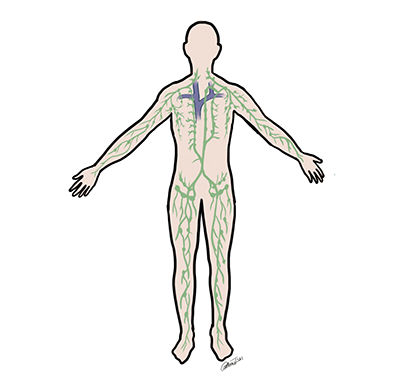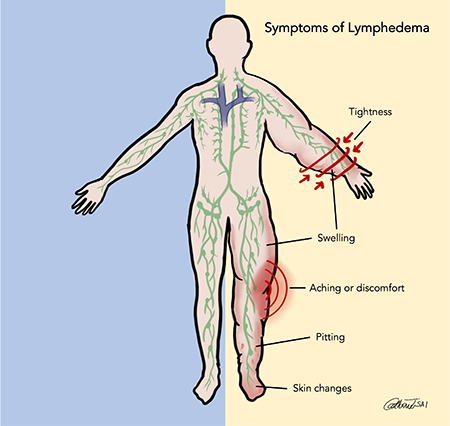Causes and Symptoms of Lymphedema
What is lymphedema?
Lymphedema refers to swelling caused by excess lymph fluid in the fat under your skin. This inappropriate buildup of fluid is most commonly due to a blockage upstream, at the level of the lymph nodes, or to the lymphatic vessels themselves. This results in fluid backing up out of the vessels, and into the surrounding fat. The swelling most commonly occurs in the arms or legs but can also occur in other parts of the body including the chest, abdomen, genitals and the head.
How does the lymphatic system work?
The body’s lymphatic system comprises a network of tiny lymphatic vessels or channels that regulate lymph fluid (a clear fluid containing infection-fighting white blood cells). These tiny vessels connect to lymph nodes located throughout the body (the gatekeepers or toll booths along the lymphatic highway) before recycling the fluid back into your blood through larger lymphatic ducts that empty into a large vein in your chest.

Our bodies produce approximately 3 liters of lymph fluid per day. Lymph fluid comes from the circulatory system, and it functions to clear impurities and alert the body of unwanted cell types, such as bacteria or cancer cells, to fight them off. Lymph is collected in lymphatic channels, which are small vessels similar to but smaller than arteries and veins. The lymph is then transported to lymph nodes. Lymph nodes are part of our immune system and serve as our body’s filters. These filters trap whatever the lymphatic fluid brings to them, and the body's immune system deals with these products. This is why, for example, lymph nodes are targeted in cancer treatment: cancer cells can be transported to lymph nodes, and these nodes are sometimes removed or radiated to kill the cancer cells.
What causes lymphedema?
Lymphedema is caused by damage to the lymphatic system. Reasons for this damage include:
- Surgery for cancer that requires removing lymph nodes.
- Radiation therapy for cancer that can damage lymph nodes and lymph vessels.
- Scarring caused by certain types of infections.
- Trauma that can disrupt lymph vessels.
- Genetic changes that affect structures of the lymphatic system.
- Other health conditions such as liver disease, vascular disease, heart disease and morbid obesity.
Lymphedema is categorized as either Primary or Secondary.
Primary lymphedema is caused by changes or mutations in genes that are responsible for developing the lymphatic system. These changes can cause dysfunction that is apparent at birth, early in life or even later in life.
Secondary lymphedema (more common) is usually caused when the lymphatic system is damaged due to cancer surgery, radiation therapy, infection, trauma or other causes.
The most common type of secondary lymphedema in the United States is related to surgery in cancer patients, often when combined with radiation. While patients are at the highest risk of developing lymphedema within the first few years after surgery and radiation, lymphedema can occur at any point after cancer treatment.
What are the symptoms of lymphedema?
Anyone can be affected by lymphedema, regardless of age, gender, or race. Signs and symptoms of lymphedema include:
- Swelling in one part of the body (arms, legs, chest, genitals, etc.)
- Feelings of heaviness or fullness in an arm or leg.
- New aching, tingling or numbness in an extremity.
- Trouble fitting arms or legs into clothing or wearing watches or jewelry despite not gaining weight.
- Skin changes including the skin feeling tight or skin color changes.
Recognizing signs and symptoms of lymphedema as soon as possible is very important to be able to begin more formal diagnosis and potential treatment right away.
Lymphedema can also increase the risk of skin infections called, cellulitis. Signs and symptoms of cellulitis include skin redness, pain, increased swelling, and warm. Fever and generalized body aches can also occur. Cellulitis is an urgent medical problem that requires immediately notifying your doctor.






